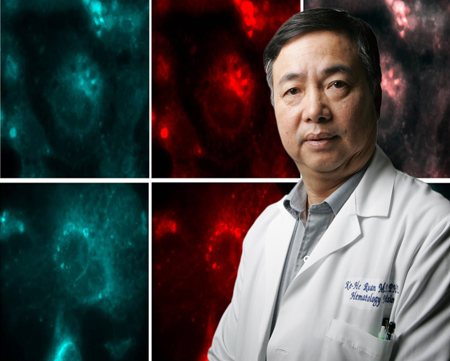Center for Experimental Therapeutics and PharmacoInformatics
Mission
Scientific Research for Better Understanding, Prevention and Therapeutics of Diseases
Goals
The Center for Experimental Therapeutics and PharmacoInformatics (CETP) is a distinctive, cutting-edge research facility at the University of Houston College of Pharmacy.

Center Director Ke-He Ruan, M.D., Ph.D., professor of pharmacology and medicinal chemistry, is investigating new therapeutics for vascular diseases and cancer via nonsteroidal anti-inflammatory drug-targeted biosynthesis of eicosanoids.
Center personnel are dedicated to:
- Providing a research environment for students and faculty;
- Sharing unique strategies within the scientific community;
- Developing novel drug therapies;
- Transferring scientific knowledge; and
- Creating focal points for biomedical research.
Technology/Capabilities
Housed on the main campus of UH, the CETP has an array of facilities and scientific instruments to enable novel drug design, testing and development, including:
- LC/MS/MS,
- Laser Doppler imaging system,
- Laser blood flow monitor,
- HPLC-Scintillation system,
- Cell signaling microscopy system,
- SGI workstations and
- Software packages for molecular modeling, NMR analysis and Virtual Screening.
History
Established as the Pharmacoinformatics Research Center, the center was founded in 2006 by a former faculty member of UHCOP. In March 2007, Professor Ke-He Ruan, M.D., Ph.D., was recruited as the director of the center. Dr. Ruan added cutting-edge technology and expanded the center, which was renamed the Center for Experimental Therapeutics and Pharmacoinformatics (CETP).
The guiding principle behind the center is to effect collaborations within the scientific community to better understand mechanisms of diseases and to develop better drugs at a faster pace with the aid of the latest technologies in drug design, such as protein engineering, high throughput and virtual screening, and stem cell and gene therapies.
The center has collaborators from institutes in the Texas Medical Center and throughout the Texas Gulf Coast medical and scientific communities, including The University of Texas Health Science Center-Houston, Texas Heart Institute, Baylor College of Medicine, M.D. Anderson Cancer Center, Rice University and The University of Texas Medical Branch. The center is also a member of the Gulf Coast Consortium for Chemical Genomics (GCCCG).